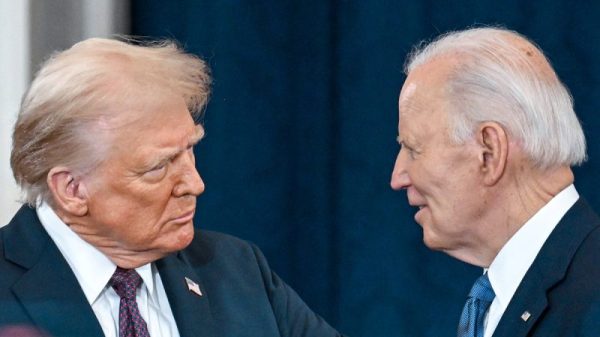The Supreme Court on Monday declined to take up an appeal by a former New Mexico county commissioner who was removed from office after he participated in the deadly Jan. 6, 2021, attack on the U.S. Capitol.
In September 2022, Cowboys for Trump founder Couy Griffin became the first elected official to be removed from office in connection to the Jan. 6 attack thanks to a provision in the 14th Amendment — the insurrection clause — which states that no person who holds any office “shall have engaged in insurrection or rebellion” against the government.
A New Mexico state district court found that Griffin, then the Otero County commissioner, was disqualified from office under Section 3 of the 14th Amendment, which was created to prevent former Confederates from returning to power after the Civil War. The Supreme Court’s decision not to hear Griffin’s appeal solidifies that lower court’s opinion, and will keep him out of office.
In a statement to The Washington Post, Griffin’s lawyer Peter Ticktin said Griffin and his legal team are looking for ways to return to court in New Mexico and re-litigate the decision.
To appeal the decision to keep him out of office, Griffin employed legal arguments similar to those used by former president Donald Trump in his own separate case before the Supreme Court challenging a Colorado court’s decision to keep him off that state’s primary ballot over his actions on Jan. 6.
In Trump’s case, the Supreme Court ruled this month that states can’t bar the former president or other candidates from appearing on a ballot for federal office under the insurrection clause, concluding that while states may “disqualify persons holding or attempting to hold state office,” they “have no power under the Constitution to enforce Section 3 with respect to federal offices, especially the Presidency.”
With their rejection of Griffin’s appeal on Monday, the justices made clear that different rules apply to state and local candidates than to those seeking federal office.
Griffin, who is also a pastor, gained national notoriety for holding horseback caravans in support of Trump. In March 2022, a federal judge convicted him of entering restricted grounds on Jan. 6. He was sentenced to 14 days in jail and a $3,000 fine.
At the time of the conviction, District Judge Trevor McFadden told Griffin that, as an elected state official, he had taken an oath to uphold the Constitution. “The actions and statements you’ve taken since then are in tension with that oath,” the judge said.
Griffin responded afterward that he felt he was upholding his oath “to make sure that our elections are transparent and legal” and that he traveled to Washington “to stand and peaceably protest” and represent “millions of other Americans that feel the same way that I do.”
Video of the attack shows Griffin and his videographer climbing over barricades and barriers, then clambering onto the inauguration stage in front of the Capitol and spending over an hour speaking through a bullhorn to the surging mob.
It was Griffin’s trial that forced prosecutors to disclose the location of Vice President Mike Pence during the riot, over Secret Service objections, to prove that Griffin had entered a restricted area, though he did not enter the Capitol itself. McFadden acquitted Griffin of disorderly conduct but convicted him of the misdemeanor charge of entering a restricted building or grounds.
In September 2022, New Mexico District Court Judge Francis Mathew removed Griffin from office, saying that, while Griffin’s actions were nonviolent, they met the definition of disqualifying behavior. Mathew’s decision to remove Griffin from office marked the first time since 1869 that a court disqualified a public official under the insurrection clause of the 14th Amendment.
Griffin reacted Monday to the Supreme Court’s decision by taking to social media and asking former president Donald Trump to make Griffin his running mate in 2024.
“I’m officially barred thru a court order of running for any other office other than the office of President,” Griffin wrote. “I wonder if that holds true to the office of Vice President?”
The Supreme Court’s decision to keep Griffin from state office could affect efforts by other states and local governments to oust other individuals who participated in the attack. The case against Griffin was filed by the same group that led the effort to disqualify Trump from the ballot in Colorado, Citizens for Responsibility and Ethics in Washington.
In a statement, the organization’s president, Noah Bookbinder, said that by refusing to take up Griffin’s appeal, the court is keeping in place “the finding that January 6th was an insurrection, and ensures that states can still apply the 14th Amendment’s disqualification clause to state officials.”
“Crucially, this decision reinforces that every decision-making body that has substantively considered the issue has found that January 6th was an insurrection, and Donald Trump engaged in that insurrection,” Bookbinder wrote. “Now it is up to the states to fulfill their duty under Section 3 to remove from office anyone who broke their oath by participating in the January 6th insurrection.”
Tom Jackman and Spencer S. Hsu contributed to this report.
The Supreme Court on Monday declined to take up an appeal by a former New Mexico county commissioner who was removed from office after he participated in the deadly Jan. 6, 2021, attack on the U.S. Capitol.
In September 2022, Cowboys for Trump founder Couy Griffin became the first elected official to be removed from office in connection to the Jan. 6 attack thanks to a provision in the 14th Amendment — the insurrection clause — which states that no person who holds any office “shall have engaged in insurrection or rebellion” against the government.
A New Mexico state district court found that Griffin, then the Otero County commissioner, was disqualified from office under Section 3 of the 14th Amendment, which was created to prevent former Confederates from returning to power after the Civil War. The Supreme Court’s decision not to hear Griffin’s appeal solidifies that lower court’s opinion, and will keep him out of office.
In a statement to The Washington Post, Griffin’s lawyer Peter Ticktin said Griffin and his legal team are looking for ways to return to court in New Mexico and re-litigate the decision.
To appeal the decision to keep him out of office, Griffin employed legal arguments similar to those used by former president Donald Trump in his own separate case before the Supreme Court challenging a Colorado court’s decision to keep him off that state’s primary ballot over his actions on Jan. 6.
In Trump’s case, the Supreme Court ruled this month that states can’t bar the former president or other candidates from appearing on a ballot for federal office under the insurrection clause, concluding that while states may “disqualify persons holding or attempting to hold state office,” they “have no power under the Constitution to enforce Section 3 with respect to federal offices, especially the Presidency.”
With their rejection of Griffin’s appeal on Monday, the justices made clear that different rules apply to state and local candidates than to those seeking federal office.
Griffin, who is also a pastor, gained national notoriety for holding horseback caravans in support of Trump. In March 2022, a federal judge convicted him of entering restricted grounds on Jan. 6. He was sentenced to 14 days in jail and a $3,000 fine.
At the time of the conviction, District Judge Trevor McFadden told Griffin that, as an elected state official, he had taken an oath to uphold the Constitution. “The actions and statements you’ve taken since then are in tension with that oath,” the judge said.
Griffin responded afterward that he felt he was upholding his oath “to make sure that our elections are transparent and legal” and that he traveled to Washington “to stand and peaceably protest” and represent “millions of other Americans that feel the same way that I do.”
Video of the attack shows Griffin and his videographer climbing over barricades and barriers, then clambering onto the inauguration stage in front of the Capitol and spending over an hour speaking through a bullhorn to the surging mob.
It was Griffin’s trial that forced prosecutors to disclose the location of Vice President Mike Pence during the riot, over Secret Service objections, to prove that Griffin had entered a restricted area, though he did not enter the Capitol itself. McFadden acquitted Griffin of disorderly conduct but convicted him of the misdemeanor charge of entering a restricted building or grounds.
In September 2022, New Mexico District Court Judge Francis Mathew removed Griffin from office, saying that, while Griffin’s actions were nonviolent, they met the definition of disqualifying behavior. Mathew’s decision to remove Griffin from office marked the first time since 1869 that a court disqualified a public official under the insurrection clause of the 14th Amendment.
Griffin reacted Monday to the Supreme Court’s decision by taking to social media and asking former president Donald Trump to make Griffin his running mate in 2024.
“I’m officially barred thru a court order of running for any other office other than the office of President,” Griffin wrote. “I wonder if that holds true to the office of Vice President?”
The Supreme Court’s decision to keep Griffin from state office could affect efforts by other states and local governments to oust other individuals who participated in the attack. The case against Griffin was filed by the same group that led the effort to disqualify Trump from the ballot in Colorado, Citizens for Responsibility and Ethics in Washington.
In a statement, the organization’s president, Noah Bookbinder, said that by refusing to take up Griffin’s appeal, the court is keeping in place “the finding that January 6th was an insurrection, and ensures that states can still apply the 14th Amendment’s disqualification clause to state officials.”
“Crucially, this decision reinforces that every decision-making body that has substantively considered the issue has found that January 6th was an insurrection, and Donald Trump engaged in that insurrection,” Bookbinder wrote. “Now it is up to the states to fulfill their duty under Section 3 to remove from office anyone who broke their oath by participating in the January 6th insurrection.”
Tom Jackman and Spencer S. Hsu contributed to this report.





















